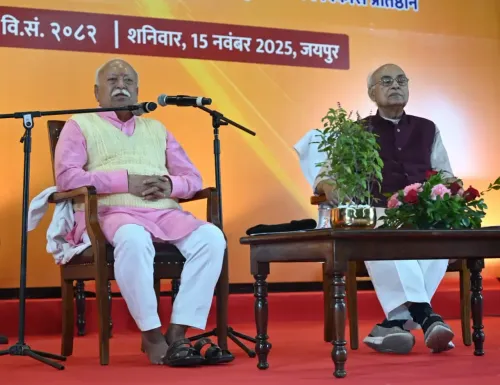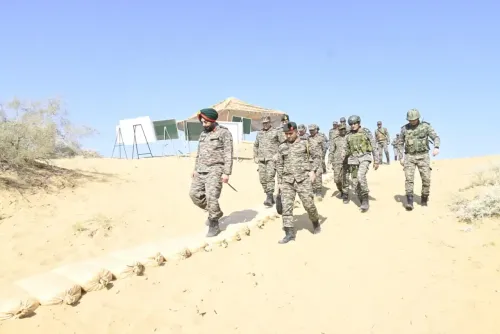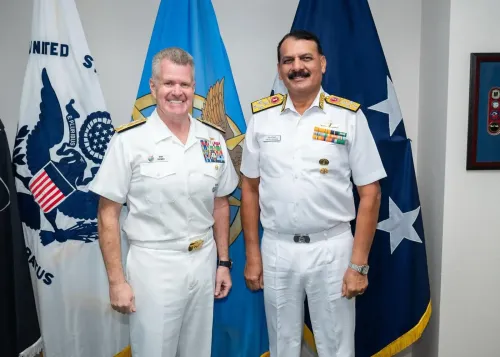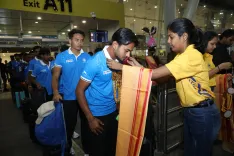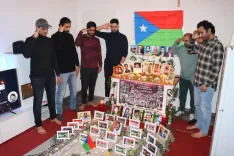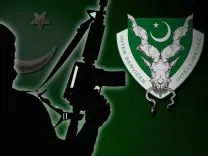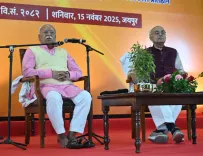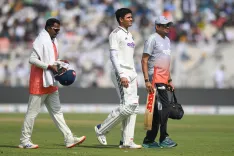What Did PM Modi Accomplish During His Gujarat Visit?
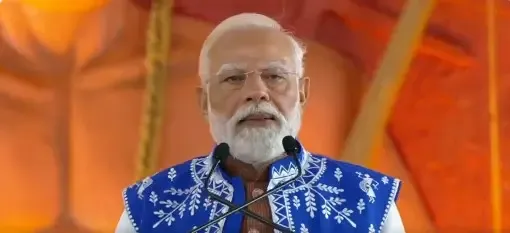
Synopsis
Key Takeaways
- PM Modi reviews progress on the bullet train project.
- Initiatives launched for tribal empowerment and rural development.
- Emphasis on preserving tribal heritage and languages.
- Significant educational advancements in tribal areas.
- Celebration of Birsa Munda's 150th birth anniversary.
Ahmedabad, Nov 15 (NationPress) Prime Minister Narendra Modi landed in Surat on Saturday, commencing an action-packed, full-day tour of his native state, Gujarat.
Upon his arrival from Delhi, he made his way to the Surat Bullet Train Station, currently under construction, to assess the advancement on the Ahmedabad–Mumbai High-Speed Rail Corridor, which stands as one of India's most ambitious infrastructure endeavors.
After the review, the Prime Minister visited the Devmogara Temple in the Narmada district, where he offered prayers to the deities that hold significant importance for the local tribal communities.
Later that afternoon, PM Modi participated in a significant public event commemorating the 150th birth anniversary of 'Dharti Aaba' Birsa Munda.
During this gathering, the Prime Minister initiated and laid the foundation stone for various infrastructure and welfare projects, addressing a large audience in attendance.
PM Modi stated, "We are establishing numerous tribal museums throughout India, including here in Gujarat. Museums have also been created in Chhattisgarh and Ranchi. Our efforts are focused on preserving tribal languages, songs, and traditions. The wisdom of these communities is profound, with stories that embody life, nature, and harmony. Our mission is to link the younger generation with this rich tribal heritage. For decades, Congress abandoned tribal communities, leaving them to struggle with inadequate education, healthcare, and connectivity. This neglect has shaped the identity of tribal regions. While Congress did nothing, the BJP prioritizes tribals. We are dedicated to rectifying the injustices they have endured and ensuring they reap the benefits of development."
Continuing his critique of the opposition, the Prime Minister remarked, "Congress never recognized the necessity to advocate for tribal rights. A separate Ministry for Tribal Affairs was established only after Atal Bihari Vajpayee assumed the role of Prime Minister. Even in Gujarat, there were no science-focused schools in tribal areas, depriving students of access to essential science education. When I served as Chief Minister, I encountered children aspiring to become scientists, doctors, and engineers. I assured them that education would pave the way for their futures, and we would eliminate all barriers. Currently, there are over 10,000 science-stream schools in tribal regions. We have constructed colleges, hostels, and universities as well."
The Prime Minister added, "The children who once confided their dreams to me are now practicing as doctors and engineers. The legacy of hard work endures among Adivasi youth. Today, numerous athletes are emerging from tribal areas, and we are enhancing sports infrastructure in these regions. I am the first Prime Minister to visit the birthplace of Birsa Munda and maintain connections with his descendants. We are implementing reforms tailored to meet the needs of the tribal community, especially for tribal farmers."
In Dediapada, the Prime Minister unveiled a variety of initiatives aimed at empowering tribal communities and promoting rural development.
This includes the 'Grih Pravesh' for one lakh homes constructed under the Pradhan Mantri Janjati Adivasi Nyaya Maha Abhiyan (PM-JANMAN) and the Dharti Aaba Janjatiya Gram Utkarsh Abhiyan (DA-JAGUA).

